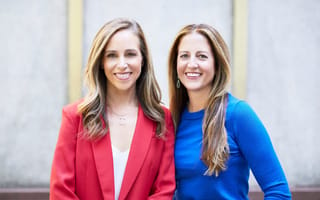
When Galyn Bernard’s kids were about to start kindergarten, they started talking about something they’d never cared about before: clothing brands.
“They were all of a sudden aware of different labels that their friends were wearing, or even that adults were wearing,” Bernard said. “That felt bad to me, that there was so much focus on that, and that at such a young age they were hyperaware: ‘Am I wearing the right thing or not?’”
Bernard and Christina Carbonell are the founders of Primary, a New York-based online children’s clothing retailer. The startup’s motto, “No logos, no slogans, no sequins,” sums up the duo’s mission to provide kids’ clothes devoid of, as they say, nonsense.
While the motto clearly lays out what the company won’t provide, Bernard and Carbonell talk more about who they include than what they exclude. Primary’s main differentiator is that its clothes are gender neutral, so there’s no separate lines for boys and girls.
We found ourselves reinventing the wheel every time something got too small, which felt like a waste of time.”
The company announced today it raised $20 million to expand its offerings and test out brick-and-mortar stores.
The investment is a vote of confidence in a company that stands out starkly from other brands in the $32 billion children’s clothing market, many of which mirror adult lines by focusing heavily on design and trends.
That focus leads to some fantastically sassy slogans and blindingly bedazzled shoes, but those things may not earn companies much love from millennial parents, who often opt for brandless products and eschew what’s “extra.”
Primary’s founders took their own desire for simpler children’s clothes and ran with it. The startup’s clothes come in bright primary colors that are designed to mix and match. There’s no embellishments and no words, and the lines are divided into “Babies” and “Kids,” with no gender tags to be seen.
The clothes’ straightforward look also boosts their longevity. Since simple styles ideally don’t pass out of fashion, products stay available for years instead of the usual months — or even weeks. This solves a problem for busy parents with kids who grow like weeds.
“We’d find something that we loved and our kids loved, and then they’d grow out of it and it didn’t exist any more,” Bernard said. “We found ourselves reinventing the wheel every time something got too small, which felt like a waste of time.”
Given that Americans throw away 80 pounds of clothing per person per year, Primary’s anti-fast-fashion approach becomes another element of its value proposition for environmentally-conscious consumers. Those cast-off clothes end up in landfills, and burning them releases harmful chemicals.
The story behind the brand.
Carbonell and Bernard met while working together at Quidsi, then-parent company of Diapers.com, now a subsidiary of Amazon.
They left five years ago to launch their own venture. They knew they wanted a concept that offered ease for busy parents, and they noticed a gap in the children’s clothing space.
“Part of what we were missing from the incumbents was the simplicity and an amazing, happy breath of color. Especially that was not [gender] prescriptive,” Bernard said.
That’s how Primary was born, and today it’s growing quickly. The company has doubled sales year over year, Carbonell said, and will close out 2019 with more than $50 million in revenue. Primary also has a Net Promoter score of 85, which indicates customers’ likelihood to recommend the company to friends. (Anything above 70 is considered “outstanding and rare,” according to HubSpot.)
Next, Primary will dip its toes into the adult market with a line of pajamas. Gender-neutral clothing gets trickier when marketing to grown-ups, as men’s and women’s bodies generally have different proportions. Nonetheless, the pajamas will be unisex and the styles won’t differ. Rather, customers can choose which fit they prefer.
For now, the company plans to stay lean in terms of hiring, Carbonell said. But they are actively looking for a CFO, engineering lead and analytics engineer. They also plan to add to their in-house creative department — as well as the merchandising and supply chain teams — as the company scales.
“This is a little cheesy, maybe, but we just feel really proud and lucky to be part of all this,” Carbonell said. “To have the opportunity to be building a brand that matters to a lot of parents and their kids, beyond, ‘Thanks for the T-shirt,’ but in ways that are more deeply rooted and aligned with our mission of bringing inclusivity to a category that historically hasn’t had much of it.”




